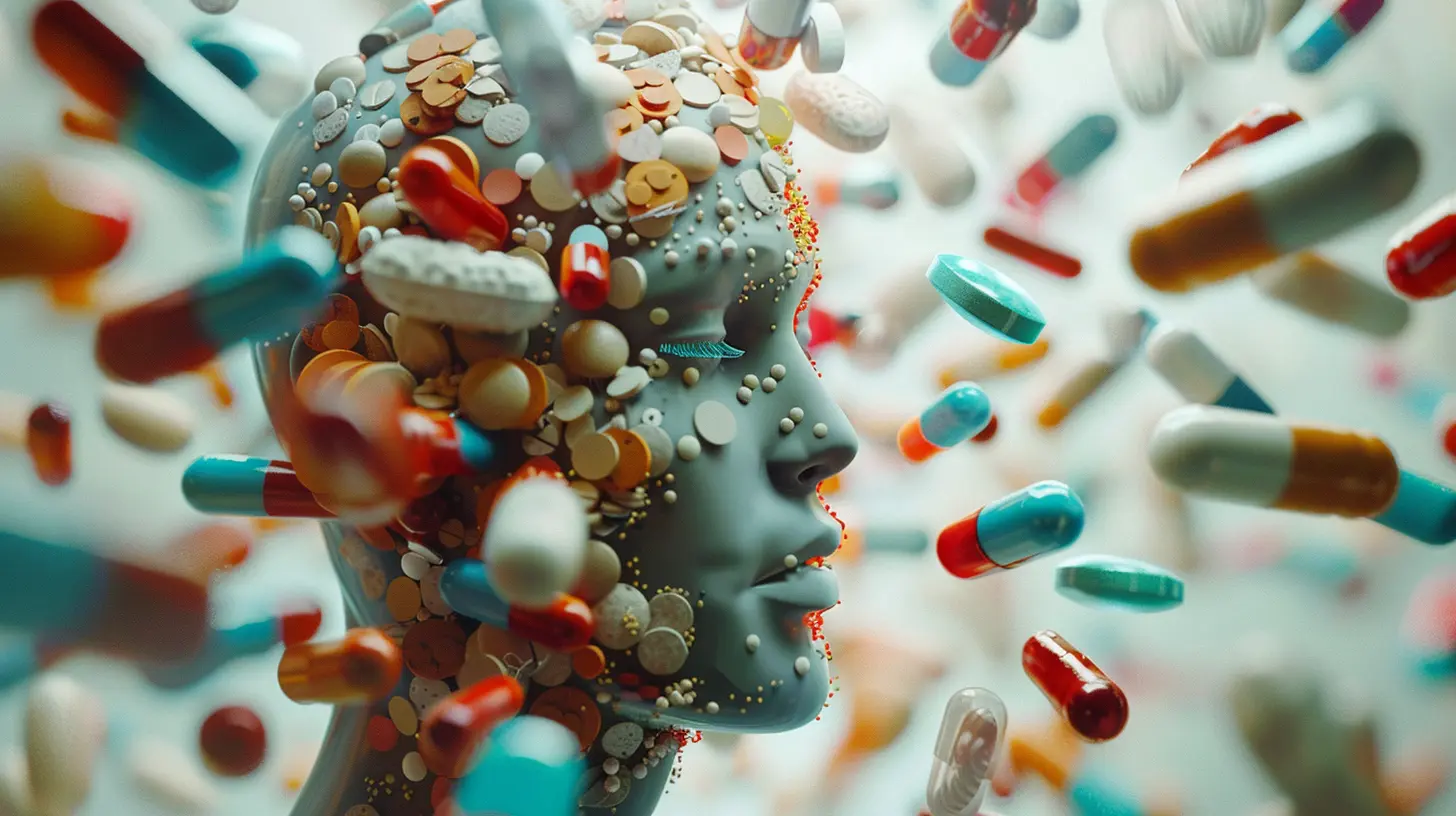Understanding the Science Behind Addiction: A Deep Dive
30 November 2024
Addiction—a word we often hear, but do we truly understand what’s happening behind the scenes? It’s easy to think of addiction as just a lack of willpower or a choice someone makes to indulge in harmful behavior. But that’s far from the truth. Addiction is, at its core, a complex brain disorder that involves both biological and psychological factors.
In this article, we’re going to dive deep into the science behind addiction, stripping away the stigma and myths surrounding it. Whether you’re curious about how addiction works, or you’re looking for answers for yourself or a loved one, this post will help you understand what’s really going on inside the mind of someone struggling with addiction.

What Exactly Is Addiction?
Let’s start with the basics—what is addiction?Addiction refers to a condition where a person becomes dependent on a substance (like drugs or alcohol) or a behavior (like gambling or gaming) despite harmful consequences. It’s not just about craving something; addiction rewires the brain, making it incredibly difficult to stop, even when the person knows it’s not good for them.
There are two types of addiction:
1. Substance Addiction: This involves being addicted to alcohol, drugs, or other chemical substances.
2. Behavioral Addiction: This includes things like gambling, gaming, or even shopping, where the addiction is more about specific activities than substances.
The key takeaway is that addiction isn’t about being weak or lazy. It’s a brain condition that alters how people think, feel, and act.
The Neuroscience of Addiction
The Brain's Reward System
To understand addiction, we need to start by looking at the brain’s reward system. At the heart of this system is a neurotransmitter called dopamine. Dopamine is often referred to as the "feel-good" chemical because it’s released when we experience something pleasurable. Whether it's eating delicious food, exercising, or even hearing a compliment, dopamine gives us that warm, fuzzy feeling.Here’s where things get tricky: addictive substances or behaviors, like drugs or gambling, hijack this reward system. These substances cause a flood of dopamine to be released, far more than what you'd get from normal activities. It’s like your brain is getting a massive hit of pleasure, and it wants more. A lot more.
Tolerance and Dependency
Over time, the brain starts to adjust to this new level of dopamine. This is where tolerance comes into play. Tolerance means that the brain gets used to the surge of dopamine, and it needs more of the substance or behavior to achieve the same level of pleasure. This is why someone might start with one drink but eventually need several just to feel the same buzz.As tolerance builds, the person becomes dependent on the substance or behavior to function normally. This is why people with addiction often feel like they need the drug or activity, not just for pleasure, but to feel "normal" or avoid withdrawal symptoms.
The Role of the Prefrontal Cortex
The prefrontal cortex is the part of the brain responsible for decision-making, self-control, and regulating emotions. Unfortunately, addiction doesn’t just affect the reward system; it also impairs the prefrontal cortex. This is why people with addiction often struggle to make rational decisions or resist cravings, even when they know the consequences.In simple terms, addiction takes over both the "go" system (reward) and the "stop" system (self-control), making it extremely difficult to quit.
The Psychological Side of Addiction
While the brain’s chemistry plays a huge role in addiction, it’s not the whole story. Psychological and environmental factors also contribute significantly.Emotional Triggers
Many people develop addictions as a way to cope with difficult emotions like stress, anxiety, or depression. For instance, someone might turn to alcohol to numb the pain of a breakup or use drugs to escape feelings of loneliness. Over time, their brain associates the substance or behavior with relief, making it harder to break the cycle.Trauma and Mental Health
Research shows that people with a history of trauma, such as abuse or neglect, are more susceptible to addiction. Additionally, those with mental health conditions like depression, PTSD, or anxiety are more likely to develop addictive behaviors. This is known as dual diagnosis—when someone has both a mental health disorder and a substance use disorder.Social and Environmental Factors
Addiction doesn’t happen in a vacuum. Social and environmental factors, such as peer pressure, family dynamics, and even socioeconomic status, can influence whether someone develops an addiction. For example, growing up in a household where substance use is normalized can increase the risk of addiction later in life.
The Cycle of Addiction
Addiction follows a predictable pattern known as the cycle of addiction. Understanding this cycle is crucial to breaking free from it.1. Initial Use
For most people, addiction starts with casual or experimental use. Maybe it’s having a drink at a party or trying a drug out of curiosity. At this stage, most people believe they’re in control and can stop whenever they want.2. Regular Use
Over time, occasional use becomes more frequent. The person might start using the substance or engaging in the behavior regularly, often as a way to cope with stress or emotional pain.3. Risky Use
At this point, the person’s behavior starts to have negative consequences, but they continue using anyway. They might experience problems at work, in their relationships, or with their health, but the addiction still takes priority.4. Dependence
Now, the person is dependent on the substance or behavior. They need it to function, and stopping leads to withdrawal symptoms like anxiety, irritability, or even physical illness.5. Addiction
Finally, the person is fully addicted. They may try to quit but find it nearly impossible. At this stage, professional help is often necessary to break the cycle.Breaking the Stigma: Understanding Addiction as a Disease
One of the biggest barriers to treating addiction effectively is the stigma surrounding it. Many people still view addiction as a moral failing or a sign of weakness, which can prevent those struggling from seeking help.But here’s the thing: addiction is recognized by the medical community as a chronic disease. Like diabetes or heart disease, addiction requires ongoing treatment and management. It’s not something that can be “cured” overnight, and relapse is often part of the process.
Understanding addiction as a disease can help shift our perspective from blame and shame to compassion and support. After all, if someone had cancer, we wouldn’t tell them to “just stop having cancer,” right? Similarly, someone with addiction doesn’t just need willpower—they need treatment and support.
Treatment Options: What Works?
The good news is that addiction is treatable. While there’s no one-size-fits-all solution, several evidence-based treatments have been proven effective.1. Behavioral Therapy
Behavioral therapies, like Cognitive Behavioral Therapy (CBT), are used to help individuals recognize and change the patterns of thought and behavior that lead to addiction. These therapies often focus on identifying triggers, developing coping strategies, and setting realistic goals for recovery.2. Medication-Assisted Treatment (MAT)
For some types of addiction, particularly opioid and alcohol addiction, medication can be an effective part of treatment. Medication-Assisted Treatment (MAT) involves using medications to reduce cravings and withdrawal symptoms, making it easier for individuals to stay sober.3. Support Groups
Peer support groups like Alcoholics Anonymous (AA) or Narcotics Anonymous (NA) provide a sense of community and accountability for people in recovery. These groups offer a safe space for individuals to share their experiences and receive support from others who understand what they’re going through.4. Holistic Approaches
In addition to traditional therapies, many individuals benefit from holistic approaches like mindfulness, meditation, yoga, and nutrition therapy. These approaches help address the mind, body, and spirit, promoting overall well-being and resilience.The Road to Recovery: It’s a Journey, Not a Destination
Recovering from addiction is a long and often challenging process. It’s not about reaching a finish line but rather about managing the disease and making healthy choices every day. The path to recovery looks different for everyone, and it often involves setbacks. That’s okay.The key is to stay committed, seek support, and remember that recovery is possible. No matter how deep the addiction, with the right combination of treatment, support, and determination, healing can happen.
Conclusion
Addiction is far more than a lack of willpower—it’s a complex brain disorder that affects millions of people worldwide. By understanding the science behind addiction, we can break down the stigma, offer compassion, and support those in need. Whether you or someone you know is struggling with addiction, know that help is out there, and recovery is possible.all images in this post were generated using AI tools
Category:
AddictionAuthor:

Gloria McVicar
Discussion
rate this article
15 comments
Alexander McVicker
This insightful article effectively elucidates addiction's complex psychological and neurological underpinnings.
February 7, 2025 at 3:31 AM

Gloria McVicar
Thank you! I'm glad you found the article insightful and helpful in understanding the complexities of addiction.
Darrow Mitchell
Thank you for shedding light on this complex issue; deeply appreciated.
February 2, 2025 at 5:12 PM

Gloria McVicar
You're very welcome! I'm glad you found it helpful.
Raina White
Addiction is not merely a lack of willpower but a complex interplay of biology, psychology, and environment. Understanding these factors can foster compassion and inform effective treatment, ultimately guiding individuals toward healthier paths.
January 28, 2025 at 5:35 AM

Gloria McVicar
Thank you for highlighting the complexities of addiction. Your emphasis on the interplay of biology, psychology, and environment is crucial for fostering compassion and effective treatment strategies.
Honor Warner
Fascinating insights! I’m eager to explore how neuroscience shapes our understanding of addiction's complexities.
January 25, 2025 at 3:19 AM

Gloria McVicar
Thank you! I'm glad you found it intriguing—neuroscience truly offers profound insights into addiction. Happy exploring!
Berenice McCracken
This article provides an insightful exploration of addiction, breaking down the complex interplay of biological, psychological, and social factors. It's a must-read for anyone interested in understanding the science behind addictive behaviors and their implications for treatment.
January 21, 2025 at 4:57 PM

Gloria McVicar
Thank you for your kind words! I'm glad you found the article insightful and informative. Your support means a lot!
Juno Oliver
Great insights! Your article sheds light on a crucial topic!
January 18, 2025 at 4:35 PM

Gloria McVicar
Thank you! I'm glad you found the article insightful.
Xena Morales
Addiction transcends mere behavior; it’s a complex interplay of biology, psychology, and environment. Understanding this intricate web invites compassion and innovation in treatment, challenging us to rethink how we approach recovery—not as a failure of will, but as a profound struggle for meaning.
January 15, 2025 at 4:50 AM

Gloria McVicar
Thank you for your insightful comment! You're absolutely right—addiction is indeed a multifaceted issue that requires a compassionate and holistic approach to treatment.
Betsy Sawyer
This article provides a clear and insightful overview of addiction from a scientific perspective. It skillfully balances complex concepts with accessible language, making it valuable for both professionals and lay readers. I appreciate the depth of research presented and the practical implications for understanding addiction more effectively.
January 9, 2025 at 5:53 AM

Gloria McVicar
Thank you for your thoughtful feedback! I'm glad you found the article informative and accessible. Your appreciation means a lot!
Aelith Rosales
Exploring the science of addiction is a vital step towards healing and recovery. With knowledge comes empowerment—let’s embrace understanding to foster compassion and support for ourselves and others!
January 2, 2025 at 5:20 AM

Gloria McVicar
Thank you for your insightful comment! Embracing understanding is indeed crucial for fostering compassion and support in the journey of healing from addiction.
Thornefield McDermott
This article effectively sheds light on the complex mechanisms of addiction, exploring biological, psychological, and environmental factors. A must-read for anyone seeking to understand this pressing issue!
December 27, 2024 at 3:41 PM

Gloria McVicar
Thank you for your insightful feedback! I'm glad you found the article informative and valuable.
Zephyrae Chapman
Insightful read on addiction science!
December 16, 2024 at 5:48 PM

Gloria McVicar
Thank you! I'm glad you found it insightful.
Soliel Hughes
In shadows deep where cravings dwell, The dance of neurons weaves a spell. With every pulse, a story told, Unlocking chains, as hearts unfold. Through science, light guides the way, To healing's dawn from night’s decay.
December 13, 2024 at 4:57 PM

Gloria McVicar
Thank you for capturing the essence of addiction's complexity and the transformative power of science in healing it! Your poetic perspective beautifully complements the deeper themes explored in the article.
Lumen Sweeney
This article effectively demystifies the complexities of addiction, blending scientific insights with practical implications. A must-read for anyone seeking clarity on the topic!
December 6, 2024 at 4:01 AM

Gloria McVicar
Thank you for your kind words! I'm glad you found the article helpful in understanding addiction.
Monica McGovern
This article does an excellent job of breaking down the complex science of addiction. It highlights crucial insights into the biological and psychological factors, making it accessible and informative.
December 1, 2024 at 3:23 PM

Gloria McVicar
Thank you for your feedback! I'm glad you found the article informative and accessible.
Astraea Palmer
Great article! I appreciated the clear explanations of addiction's complexities and the importance of evidence-based treatment approaches.
November 30, 2024 at 4:38 AM

Gloria McVicar
Thank you! I'm glad you found the article helpful in understanding addiction and the value of evidence-based treatments.
MORE POSTS

How to Use Behavioral Psychology to Enhance Learning and Education

The Different Faces of Schizophrenia: Myths and Facts

Unlocking the Power of Emotional Growth: A Path to Inner Strength

How Cultural Sensitivity Can Improve Mental Health Advocacy

How to Recognize and Manage Stress-Induced Fatigue

Emotional Growth Through Forgiveness: Letting Go for Good

How Gratitude Practices Can Boost Your Motivation

The Role of Sleep in Addiction Recovery

The Impact of Divorce on Mental Health

The Art of Saying No: Protecting Your Mental Health from Overcommitment